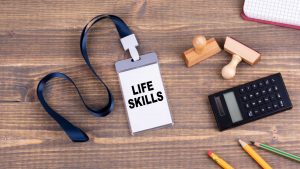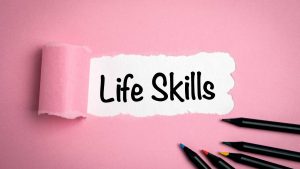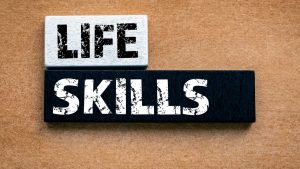Life skills education refers to the teaching of important life skills that are essential for both personal and professional success. These skills can be anything from how to manage money to how to deal with difficult people. They can be learned in school or outside of school, and they are usually the foundation for other types of education, such as vocational training or college. In this article, we’ll explain what life skills education is, and we’ll give you a few examples of life skills that are often included in curriculums.
What are Life Skills?

Life skills are the skills that you need to live a successful and fulfilling life. They include things like communication, problem-solving, critical thinking, and more. Though they can be learned in school, many of these life skills are also necessary for work or everyday life. Without them, it can be difficult to get along with others, handle stress effectively, or make decisions under pressure. Learning these life skills can help you achieve your goals and reach your potential in all areas of your life.
What is Life Skills Education?

Life Skills Education (LES) is a type of education that teaches students how to deal with common life challenges. It can help them develop skills that will be helpful in their careers and lives, such as problem-solving, communication, and critical thinking. There are a number of different LES programs available across the country, and they vary in terms of the content they cover. Some programs may focus on specific areas like finance or job hunting, while others may provide a more general overview.
Whatever the program offers, it is important to make sure that it is tailored specifically to your needs. This means that you’ll need to take into account your interests, career goals, and educational background before enrolling in one. Overall, LES is a great way to develop skills that will be useful in both your personal and professional lives. It’s an ideal way to prepare for future challenges and improve your overall well-being.
Importance of Life Skills Education

There is no doubt that in today’s world, the skills you develop are important. In fact, they may be more important than ever before. Here are five reasons why:
1. A competitive job market
With a global workforce of over 1.5 billion people and an unemployment rate of below 5%, there is a lot of competition out there for good jobs. If you don’t have the right skills, you’ll struggle to find a job that’s right for you and your career goals.
2. Rapid change
The world is constantly changing, and so are the needs of employers and employees. If you don’t keep up with the latest trends and learn new skills quickly, you’ll be at a disadvantage when it comes to finding work or competing for promotions.
3. Rising costs
Just about everything in life is getting more expensive these days – from food to rent to tuition fees. If you want to survive in today’s economy, it’s essential that you have the skills necessary to get ahead.
4. The emergence of new technologies
It used to be that if you wanted to learn something new, you had to go through traditional school systems or take time off work. But now there are many different ways to learn – including online courses and boot camps – so there’s always something available for anyone who wants it!
5. Increasing social isolation
In the past, people looked to friends and family for support and guidance. But with more people working remote jobs and spending more time online, there’s less opportunity for social interaction on a daily basis. If you don’t have a life skills education that includes plenty of social activity, you may find yourself feeling isolated and alone in today’s world.
Types of Life Skills

1. Confidence skills are essential for anyone who wants to live a successful life. They help you take control of your own destiny and manage your own emotions.
2. Decision-making skills are also important, as they enable you to make smart decisions that will lead to positive outcomes.
3. Stress alleviation skills can help you deal with difficult situations head-on and minimize the impact they have on your life.
4. Adjustment skills in adversity are important because they help you to deal with difficult situations. They allow you to identify and respond to problems quickly and calmly so that you can adapt and continue moving forward.
5. Self-awareness skills refer to your awareness of who you are as a person, what you like and don’t like, and how you relate to other people. They also involve being able to accurately assess your current situation and make decisions accordingly. This skill is essential for adjusting successfully in difficult situations.
6. The skill of negative tendency towards wrongdoing refers to the ability not to get caught up in bad behavior or addiction. It involves recognizing when something is going wrong and taking appropriate steps in order for it not to continue.
7. Positive behavior is the habit of behaving in a way that’s conducive to your own well-being and that of others. It involves setting boundaries, establishing good values, and taking responsibility for your actions. It can be learned through training and practice, and it’s one of the most important life skills you can develop.
8. Critical thinking is the ability to think critically about information and ideas, and to evaluate them objectively. It’s essential for problem-solving, critical thinking skills, decision making, and more. Critical thinking skills are also needed in fields like law, business, science, engineering, and medicine where there are often complex decisions to be made.
9. Society’s skills toward each other are the abilities we have to cooperate with each other peacefully and productively. These skills include communicating effectively, resolving conflicts peacefully, working together as a team (and standing up for each other when necessary), cooperating with authorities when required, etc. They’re essential not just in everyday life but also in fields like law enforcement, healthcare delivery, etc., where cooperation is crucial for success.
10. High-level skills are those that enable you to do things that no one else can do easily or at all – they’re extremely specialized knowledge or techniques that few people possess but which are essential for certain occupations or fields of study. For example, surgeons need to have skills in anatomy, pharmacology, and many other specialized areas.
Conclusion
There are many definitions for Life Skills Education, but the underlying goal is ensuring all students develop the ability to become socially, emotionally, and academically competent. Life skills education helps learners in developing their potential by understanding their strengths and areas where they can improve. It also encourages them to think ahead about how they can make a difference in the future so that they know how to adopt new lifestyles when necessary.









Leave feedback about this